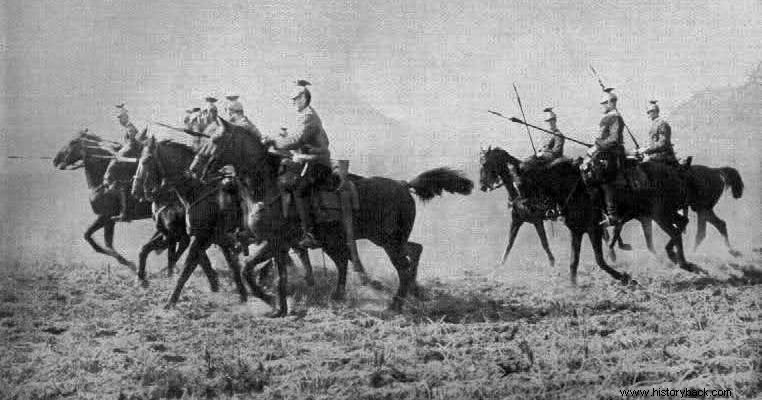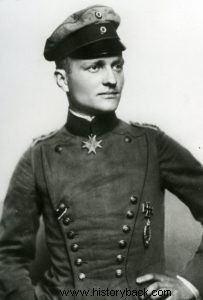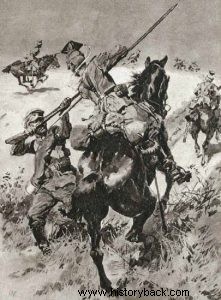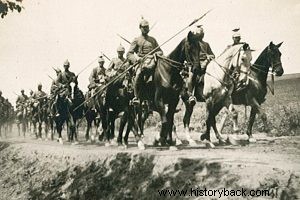
On May 2, 1892, a pleasant disturbance prevailed in the house of Baron Albert von Richthofen. The cries of his son and successor of the family tradition were first heard that morning. Chieftain Richthofen could not hide his joy. He held his son in his arms, the one he hoped would continue their family's long tradition of war.
The baron's son was named Manfred Albert. He was the second child in the family. At the age of 13, Manfred was admitted to the military college in Wallstatt. As he later stated, he did not particularly wish to pursue a military career. He simply submitted to his father's wishes. However, Manfred never excelled in his studies.
He was rather careless and the best he managed was to secure such grades that he merely "passed" the classes. Finally, after attending both the Gross Lichterfelde military school and the Berlin war school, he was named, in 1912, a lieutenant general and assigned to the "Alexander III's Ulan (lancers) Regiment". His unit was based in Breslau, Silesia.
War in the East
The summer of 1914 was quiet. On the evening of August 1, Manfred had organized a small celebration together with his colleagues in their lodgings. But they didn't have time to be very happy. They were soon informed that their country was at war with Russia. This was followed by a toast to the victory and the Kaiser and the inglorious end of the celebration. From the next day the war began for the young general.
At midnight on August 2-3 Lieutenant General Richthofen undertook his first war patrol. At the head of a ulama of Ulans, Richthofen moved and captured the small village of Kalich. Richthofen stayed for five days in the village. On the last day of his stay, a section of Cossacks also entered the village. The Germans risked being surrounded. However, they managed to escape.
Meanwhile the great German offensive on the Western Front was in full swing. It was therefore decided to send significant German forces to the West, which until then had been fighting in the East. Among the units that received the lead to the West was the 1st Ulan Regiment in which Manfred served.
In the West
His regiment was attached to an infantry division, much to the chagrin of the young lieutenant, who still held a more romantic view of war, nostalgic for the great massed cavalry advances of the past. "I often take over patrols and try to earn the Iron Cross" , he wrote to his mother. As the regiment moved through Luxembourg the illusions finally began to leave him.
Manfred's dream of fighting on horseback like his forefathers in the Napoleonic Wars faded before the barbed wire and the machine gun. Even more, however, Manfred was disappointed by the development of his first real contact with the enemy. The young lieutenant was sent, at the head of 15 Ulans, to perform reconnaissance in an area 20 km west of Arlon. Suddenly, on the edges of a nearby forest, the Germans spotted a group of French dragoons.
At once Manfred gave the signal for the charge, and his lancers, lances lowered and shouting war-cries, charged against the French. The dragons, however, did not stop to face the attack but fled. The Germans followed them into the forest. But they were surprised to find that their opponents had disappeared from the face of the earth. The pursuit stopped and the Ulans stood in a forest clearing.
Manfred took his binoculars and tried to see. But he did not have time to bring them to his eyes and a thunderbolt tore through the air with a wave and struck his men. The Germans then realized to their horror that at a distance of only 50 meters in front of them there were 200 French riflemen. Confusion ensued. Manfred tried to lead his men back. But for most it was already too late. Devastated, Manfred fled, followed by only four of his men. "The baptism of fire was not at all fun, as I thought," he later wrote in one of his letters.
Contact with the plane and the trenches…
After the border battles the German armies advanced into Belgium and France. During his march through Belgium, Manfred saw an airplane for the first time in his life. He noticed the strange flying machine without paying much attention. As he later said “I had no idea what our airmen were doing. I had no idea that German aircraft carried cross markings and enemy aircraft carried tricolor markings.
As a result we were shooting at every aircraft." In Belgium, however, Manfred had the opportunity to fight "as befits a horseman". His division often undertook reconnaissance missions and daily skirmishes with corresponding French divisions were daily. A little later, however, his regiment was subordinated to the 5th Army which was fighting at Verdun. There, to Manfred's chagrin, the hulan regiment took over guarding the trench sector, just like the regular infantry.
On a rare occasion on a mounted patrol Manfred was nearly killed when an improvised grenade exploded next to him and dislodged his horse's saddle, but he was unhurt. This period of the "trenches" was the most inglorious and uncomfortable for the noble lieutenant. He wrote bitterly:“We are now in the trenches like the infantry. At a distance of 2,000 meters in front of us are the French. It is not interesting to sit quietly for 24 boring hours every day.
"Some missiles are passing over us. This is also the only experience I have had for four weeks. It bothers me that we don't get into a big battle. For weeks now, the positions have not moved more than 50 meters. I would very much like to earn the Iron Cross 1st Class, but here I will never have the chance. I shall have to put on a French uniform and go to Verdun and blow up any gun-towers (of the forts) in order to succeed.''
So autumn passed and winter came. In January 1915 Manfred was appointed assistant chief of staff of the 18th Infantry Brigade. At the same time his brother was fighting "as a cavalryman" on the Russian front. It was the ultimate humiliation for Manfred. Although the fighting was raging to the west, an unnerving calm still prevailed in the Verdun sector.
In May 1915 Manfred went home on leave. On his return to the front three weeks later, Manfred assumed the duties of logistics officer. This the young lieutenant could not bear. He asked his commander to be assigned to the military air force. It is said that to support his application he had appeared before his commander and told him "I did not come to war to collect cheese and eggs"! However, the issue was that his application was finally accepted. Germany had won its greatest ace



